|
[overview] WTO Cancun : achtergrond | enjeux | video | breaking news by lize Monday August 25, 2003 at 07:37 PM |
| lize@indymedia.be |
[NL] De Wereldhandelsorganisatie (WTO) zal van 10 tot 14 september vergaderen
in het Mexicaanse Cancún. Op de agenda staan verdere onderhandelingen over de
vrijmaking van de handel in goederen, voedsel, openbare diensten en geneesmiddelen.
De rijke landen willen ook een vrijer verkeer van investeringen opleggen. Net
als in Seattle zullen tienduizenden activisten pogen om de WTO-top in Cancún
te
laten mislukken, gesteund door solidariteitsacties overal ter wereld.
[FR] C'est à Cancún que l'Organisation Mondiale du Commerce (OMC) se réunira du 10 au 14 septembre. À l'ordre du jour: de nouvelles négociations sur la libéralisation du commerce des biens, des produits alimentaires, des services publics et des médicaments. Les pays riches veulent imposer plus de liberté de circulation pour les investissements. Comme à Seattle, des dizaines de milliers d'activistes s'apprêtent à faire échouer le sommet de Cancún, soutenus par des actions de solidarité dans le monde entier.
achtergrond-enjeux | video [EN] | doorbraak TRIPS akkoord ?-tournant dans l'accord TRIPS ? | lees meer-lire plus
|
| achtergrond | enjeux | videos [EN] : Wat is er mis met deze WTO ? | Qu'est-ce qui ne va pas avec cette OMC ? |
| [WTO
?] video [EN] by
Focus on the Global South [NL] Wat is de WTO ? by lize [NL] De WTO? by Het Rooje Nest [FR] L'OMC, kezako? by lize [adapté du néerlandais par duende] | 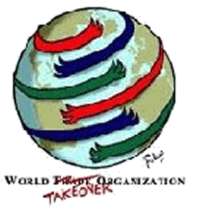 |
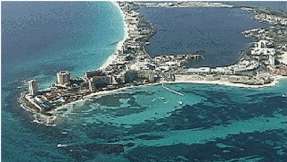 | [WTO
Cancun ?] video [EN]
by Focus on the Global South [NL] Wat staat op de agenda ? by lize [NL] Start van onderhandelingen over vrijmaking investeringen ? by lize [NL] The Battle Within: de agenda in Cancún by TUc [NL] Multinationals vragen om flexibiliteit voor landbouw en biotechnologie by Het Rooje Nest [NL] Ontwerpakkoord zet de ontwikkelingslanden nu al buiten spel by lize [NL] Nieuwe WTO-top in de lente van 2004? by Stijn [FR] Quel est le programme? by lize [adapté du néerlandais par duende] [FR] Compte à rebours pour Cancun by Aileen Kwa [FR] Bientôt la conférence de Cancun by Raoul Marc Jennar |
| [Democracy
?] video [EN]
by Focus on the Global South [NL] Ondemocratische besluitvorming binnen de WTO by lize [FR] Des processus de décision non démocratiques au sein de l'OMC by lize [adapté du néerlandais par duende] | 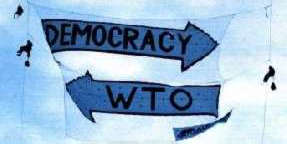 |
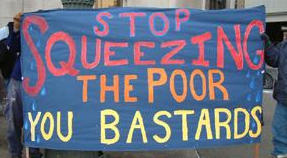 | [Food
Security ?] video [EN] by Focus on the Global South [FR] L'accord agricole de l'OMC by lize [adapté du néerlandais par duende] |
[TRIPS
?] video [EN]
by Focus on the Global South [NL | FR] Overview GATS - AGCS by christophe | 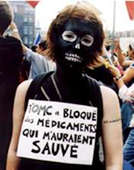 |
|
| Een doorbraak in het TRIPS dossier ? | Un tournant dans le dossier TRIPS ? |
[NL] De Wereldhandelsorganisatie bereikte op zaterdag 30 augustus
een akkoord over de verstrekking van generische geneesmiddelen aan arme landen.
Hoewel het
akkoord naar de publieke opinie toe als een oplossing voorgesteld, is het in
wezen niets meer is dan een broodnodige maar dodelijke (althans voor de ontwikkelingslanden)
P.R.-stunt in de aanloop naar de WTO-top
in Cancun.
Wereldhandelsorganisatie
bezorgt zieken nog steeds geen geneesmiddelen by Wim
De Ceukelaire September 06
De perfecte misdaad: miljoenen slachtoffers, slapend rijk
en toch applaus op alle banken. Het recente WTO akkoord over de handel in
goedkope generische
geneesmiddelen is geen “bewijs dat de ontwikkelingsdimensie van de
wereldhandel geen droom is” – zoals minister Michel triomfantelijk
aankondigde.
‘Akkoord’ voor
toegang tot medicijnen in WTO: beter geen oplossing dan een valse oplossing!
by
Stijn Oosterlynck September 03
Eind vorige
week bleek er plots een akkoord te zijn rond de toegang
tot medicijnen voor ontwikkelingslanden. De vraag is echter of dit akkoord
meer is dan een voor de fel geplaagde WTO broodnodige P.R.-stunt.
NGO's
unaniem: "Geneesmiddelenakkoord WTO is slecht akkoord voor derde wereld."
by
christophe callewaert September 01
De Wereldhandelsorganisatie
heeft zaterdag een akkoord goedgekeurd over de verstrekking van generische geneesmiddelenaan
arme landen. Minister van Buitenlandse Zaken Louis Michel toont zich “opgetogen”
over deze doorbraak. De NGO’s zijn dan weer niet te spreken over het akkoord.
[FR]
OMC: Victoire
des firmes pharmaceutiques occidentales by Agnès
Bertrand et Raoul Marc Jennar September 03
Ce samedi 30 août, le Conseil général de l'Organisation
Mondiale du Commerce a approuvé un document présenté comme
un accord qui n'apporte qu'une solution partielle et limitée.
|
| lees meer | lire plus | read more |
[NL]
11.11.11. | Global info : WTO.zip nieuwsbrief 28 | 27 | 26 | 25 | 24 | [archive] WTO.zip | Oneworld.nl info WTO | Novib info WTO | Milieudefensie WTO-info
[FR]
Campagnes
OMC d'Attac France
OMC,
AGCS d'Attac Yonn
OMC et droit au développement / Les enjeux de la conférence
de
Cancun
par Arnaud Zacharie, Attac Wallonie-Bruxelles, CNCD
OMC, un état des lieux (1) - Les sujets de Singapour par Gérard
Surdez, Attac
Sommet de l'OMC:
Contre l'Ordre Marchand Capitaliste! by Michel Husson
[EN]
![]()
Welcome
to the EC's Hall of Shame by Corporate Europe Observatory (CEO) (posted by
Het Rooje Nest)
Business
rules : who pays the price ? [pdf] by Friends of the Earth & Corporate European
Obervatory
how corporate influence in the WTO impacts people
and the environment
Friends
of the Earth International | WTO
& GATS | WTO watch
|
NGO by WIDE - Women in Development Europe Thursday September 04, 2003 at 08:09 AM |
WIDE: Globalising Gender Equality and Social Justice
PROMOTING A DEVELOPMENT AGENDA THROUGH TRADE?
A Critique of the EU position in WTO negotiations
from a gender perspective
WIDE’s position paper
for the 5th WTO Ministerial Meeting,
Cancun, Mexico
(10-14 September 2003)
INTRODUCTION
In view of the 5th WTO Ministerial Meeting in Cancun, WIDE joins the worldwide call of social movements and NGOs to stop the ongoing expansion of the WTO agenda to new areas currently supported by proposals on the initiation of negotiations on the so-called ‘New Issues’. The WTO, with its sanction system, is not the appropriate body to regulate areas of importance for economic and social development including investment and government procurement.
WIDE is also alarmed by the lack of democracy, transparency and accountability in the ongoing WTO negotiations. This is manifested in the lack of participation of national parliaments and civil society organisations as well as in the unequal terms on which developing countries are participating in the negotiations. The participation of developing countries is impacted not only by the lack of human and financial resources and technical skills, but mainly by informal and non-transparent practices of reaching or ‘manufacturing’ consensus among WTO members, such as consultations at informal meetings or mini-ministerials with a pre-selected small group of countries.
Furthermore, WIDE wants to point out that concerns over development were restricted to the preamble of the Doha Declaration, while clearly specified commitments under the different negotiating areas remained ‘empty words’, despite the claimed commitment of WTO members to development objectives! This has been confirmed by the lack of progress so far in WTO negotiations on areas of importance for developing countries, including the Agreement on Agriculture (AoA), the Doha Declaration on TRIPS and Public Health, Special and Differential Treatment (SDT) and Implementation Issues. At the same time, through the negotiations on GATS and the proposed Agreement on the New Issues, new rights are being granted to foreign investors and Transnational Companies (TNCs), clearly indicating thereby who are the real actors and beneficiaries in the drive of the WTO agenda and negotiations!
From a gender perspective, it is important to emphasise that trade liberalisation, investment, commercialisation of agricultural activities, deprivation of women farmers of their traditional knowledge and privatisation of social services result in increased gender inequalities. Through the relevant WTO agreements (Agreement on Agriculture, TRIPS and GATS), women continue to have limited access and control over land, income, credit, technology, social services and natural resources. In many countries, women bear the main responsibility for collecting, storing and distributing essential goods, such as water and fuel within the family and the community. Overlooking women’s central role in local communities, the process of liberalisation in services impacts on women’s ability to access services in areas essential to human development, including water, health, education, energy and transport.
Despite the significant impact of trade policies on women’s livelihoods, WTO remains a gender-blind institution. Women’s central role in development as well as the importance of women’s contribution to both productive and reproductive activities is left out of WTO discussions and negotiations.
As to the EU, trade liberalisation is being advocated as an essential element of the development agenda. Yet, trade liberalisation not only fails to result in more equality but in many cases results in the emergence of new forms of economic and social exclusion and consequently, in increased poverty. A gender analysis of EU positions in the context of WTO negotiations on Agriculture, GATS and the New Issues is revealing the following:
Agreement on Agriculture (AoA)
WTO NEGOTIATIONS AND THE EU POSITION
In view of Cancun, the EU negotiating position on the AoA is most likely to be impacted by the outcome of the new Common Agricultural Policy (CAP) Reform that the EU has concluded on 26 June 2003. This supposedly ‘ambitious’ reform has raised considerable criticism in the NGO community.
The new CAP reform to be implemented is far away from seriously addressing unfair competition and unfair world market prices. With regard to three areas of the WTO negotiations i.e. market access, export subsidies and domestic support, the reformed CAP explicitly touches on the area of domestic support to the EU farmers, while it fails to address the other two areas. Despite the EU’s commitment to ‘decouple’ subsidies from agricultural production, domestic subsidies (even reduced) will continue to facilitate over-production and export dumping of agricultural products. As a result, the problem of surplus production in European agriculture is not solved, exports of surpluses is therefore still a centrepiece of this reform. The basic orientation to make heavily subsidised food available at low prices on world-markets did not change.
Concerning the so far WTO negotiations on the AoA, these have come to a standstill because of the divergence in views between developed and developing countries. Proposals by developing countries for the creation of a Development Box have met the resistance of the EU and the US.
In addition, the EU is more supportive to the idea of providing further market access to agricultural products of developing countries rather than address the issue of its own subsidies.
CRITICAL ANALYSIS FROM A GENDER PERSPECTIVE AND WIDE’S POSITION
Agriculture is a key area to poverty alleviation and development for many countries in the South. Yet, EU policy has already severe effects on the agricultural sector in developing countries and on people working in local food-processing, -trading and -marketing branches, and especially on women who are the principal food producers and providers. The EU position for Cancun will not help to improve this. Rural women are responsible for half of the world’s food production and produce between 60 and 80 percent of the food in most developing countries. Women are the main producers of the world’s staple crops-rice, wheat, maize that provide up to 90 percent of the food intake of the rural poor.
Despite their contribution to global food security, women farmers are frequently underestimated and overlooked in both EU trade policies and development strategies. There are no indications that the EU is at least considering to address unfair gender-relations in agriculture and agricultural trade policies. At the same time, gender bias and gender blindness persist: women find it more difficult to gain access to valuable resources such as land, credit and agricultural inputs, technology, extension, training and services that would enhance their production capacity. Instead of improving, this pervasive situation tends to worsen in the context of WTO negotiations and trade liberalisation.
Indeed, looking at the current WTO negotiations on agriculture and the EU position, it is important to outline that the world-market-based model of trade in agriculture is relying on capital-intensive pathways of development (high-tech agriculture) promoting the interests of agri-business, while introducing purchasing-power as an access-limiting factor for the basic needs and rights of women. On the other end of export-promoting, high-tech based global agricultural production-chain in Southern (and partly as well in Northern) countries are standing women in small-scale farming, women in local food-processing and food-trading for local and regional markets. This kind of agriculture promoted by the trade liberalisation (monocultural crops, Genetically Modified Organisms (GMOs), export subsidies, export-oriented production) threatens food sovereignty and small scale farming, increasingly a domain of women, which is an important prerequisite to the sustainable use of biological diversity and food security. In this direction the transformation of agriculture to meet the needs of a globalised market economy is contributing to the gradual erosion of women’s biological resources and knowledge systems.
Most importantly, export-oriented agriculture and imports of cheap subsidised agricultural products in local markets impacts negatively on rural women and small-scale women farmers while destroying local production systems.
DEMANDS
The EU should promote a model for sustainable development which recognizes explicitly women’s central contribution to agriculture and women’s empowerment as the key to raising levels of nutrition, improving the production and distribution of food and agricultural products and enhancing the living conditions of rural populations. Through its policies in both areas of development and trade, the EU should promote women’s legal access to resources, land, seeds, credit and training.
With regard to the forthcoming Cancun Ministerial Meeting and the negotiations on the AoA, we call the EU to:
• Immediately put an end to its export subsidies and dumping of cheap agricultural products in the local markets of developing countries. Furthermore, it should promote the principle of Special and Differential Treatment (SDT) of developing countries in the agricultural sector.
• Support the creation of a Development Box as outlined by the proposals of developing countries: agricultural products essential for food security have to be taken out of WTO without administrative burden. These products should be exempt without restrictions from commitments undertaken by developing countries for further tariff reductions.
• Defend the right of developing countries to use government spending for the support of small farmers and more specifically, women farmers.
• Conduct an assessment of the reformed CAP on food sovereignty, poverty reduction and women’s livelihoods in developing countries in order to ensure coherence between its development and trade policies from a gender perspective.
• Remove agriculture from the WTO negotiations agenda if the demands of the developing countries are not met.
General Agreement on Trade in Services (GATS)
WTO NEGOTIATIONS AND THE EU POSITION
As GATS is a part of the so-called ‘WTO Built-in agenda’ at the forthcoming Ministerial Meeting, WTO members are expected to take stock of the progress in negotiations so far. The EU is one of the strongest proponents of liberalisation in the services’ sector (under the pressure of major corporate lobby groups). In the first round of negotiations, the EU has put forward 109 requests to developing countries, of which 70 are in the water sector (environmental services).
The EU argues that the principle gains for developing countries in the GATS negotiations will come from opening their markets to foreign investors. The EU claims that its requests seek a reduction in restrictions and expansion of market access opportunities for European services exporters, rather than the dismantling or the privatisation of public services and state-owned companies. With regard to the environmental services, the EU argues that requests in this sector do not touch on the issue of access to (water) resources and in no way undermine or reduce host governments’ ability to regulate pricing, availability and affordability of water supplies.
Furthermore, the EU argues that its requests to developing countries take account of the level of development of individual members: the EUC is seeking commitments in a limited number of sectors and modes of supply for LDCs . In its argumentation, the EU puts specific emphasis on the importance of services in the European economies, while noting that trade in services is also a “key element of the Doha Development Agenda in fulfilling the objective of making trade to pull developing countries out of poverty”. There is incoherence between the EU public rhetoric and its position in the negotiations on services: Commissioner for Trade Pascal Lamy appears to ‘defend’ European social services (education-health etc), while the EU is the strongest advocate of liberalisation of services in the countries of the South!
CRITICAL ANALYSIS FROM A GENDER PERSPECTIVE AND WIDE’S POSITION
The provision of social services and public goods, including water, health care, education, energy and transport is essential to human development and gender equality. Yet, instead of ‘pulling developing countries out of poverty’, GATS and liberalisation in social services’ provision will have a negative impact on people’s livelihoods, while undermining efforts by developing countries to fight poverty and women’s economic and social rights (through increase in prices, deterioration in the quality of social services, the dismantling of public services and the consequent increase in women’s reproductive labour, deterioration of labour conditions in the services’ sectors in which women represent 80 percent of the labour force etc). The agreement in question is a threat to sovereignty and the right of states/governments to guarantee to their citizens affordable access to social services of high quality as well as the rights to guarantee labour rights and standards (ILO), to take measures to promote women’s equality and gender justice and to protect the environment. A critical review of the interests represented in these negotiations show that mainly TNCs profit from this process.
Privatisation of social services appears to be in contradiction with women’s fundamental and economic rights. Through price increases women and girls lose access to education and health services, while their chances to empower themselves are diminishing. In Ghana, for example, the privatisation of the water system with the increase of water rates, which is still underway, has already obliged women in poor households to make important trade-offs in order to provide for water, such as drinking water from a polluted well to save money for other domestic expenses. As a consequence, cholera and typhoid have been rising into epidemic proportions and the victims are usually women and children. In schools, the drop out rate has also increased tremendously, particularly among girl-children .Yet, in the ongoing negotiations on GATS, the EU has failed to consider the ways in which women will be affected in their roles as workers, consumers and providers of unpaid but yet, socially indispensable work.
Looking at the structure of the agreement, the ‘flexibility approach’ of GATS negotiation appears also to be a myth. Through the request-offer modalities governments are put under pressure to liberalise key service sectors: developing countries acceding to the WTO have found themselves in a weak position to resist such pressure. The ’progressive liberalisation’ under GATS means that it is actually a never-ending process pressuring countries until they liberalise everything. There is, on top of that, no option of reversibility once a sector is subject to liberalisation. Moreover, liberalisation of financial services increases the risk of financial crisis in developing countries, contributing in this way to economic instability with significant implications for human (economic and social) development in the countries of the South. “The claims that liberalising financial markets will broaden access to these markets and expand opportunities and credits have not been proved for women” .
DEMANDS
With regard to the fifth Ministerial Meeting and the negotiations on GATS, we call the EU to:
• Reconsider all its requests to Southern countries to open up their services’ sectors in order to ensure coherence between its development co-operation and trade policies and the compliance of these policies with human rights and sustainable development objectives, including gender equality and women’s empowerment. The EU should not pressurise developing countries to open up any services’ sectors or eliminate controls of capital movements. Governments should not be ‘locked in’ any kinds of agreements.
• Complete a development, social and gender impact assessment of its requests to developing countries before proceeding to the next phases of negotiations. Such an assessment should be undertaken with the participation/consultation of civil society and more specifically, women’s organisations from both Europe and countries in the South, which the EU is targeting with its requests.
• Promote the participation of national parliaments, civil society organisations and women organisations in all phases of negotiations (including implementation and monitoring of the agreement in question) with developing countries. Despite the supposed commitment of the EU to transparency, GATS negotiations are an undemocratic process. Decisions are reached without public consultations with those people, women and men, whose livelihoods are severely impacted by liberalisation in services’ provision. In this process, women can be seen as key actors in defining a more holistic and human-oriented economic environment. In the same direction, the EU should provide to civil society increased and timely access to information in order to achieve its genuine participation in the negotiation of agreements with different countries.
• Exclude social services (water, education, health, public transport, social insurance) from GATS negotiations and withdraw water from the EU requests. States should reserve the right to secure for their citizens’ access to social services, especially for poor women, as well as promote women’s equality, protect worker’s rights, support minorities, save the environment, etc.
Investment and the New Issues
WTO NEGOTIATIONS AND THE EU POSITION
The EU is one of the strongest supporters of the formal launch of negotiations on the New Issues at the WTO level and the principle of ‘single-undertaking’. In his statements, Commissioner Lamy argues that the EU seeks the creation of a coherent/basic framework of multilateral rules on investment based on the following elements: transparency and non-discrimination towards foreign investors (through adherence to the principles of Most-Favoured Nation and National Treatment), while focusing on Foreign Direct Investment (FDI), leaving aside short-term capital movements or other forms of financial investment.
The EU also clarifies that admission of FDI, as well as National Treatment and Market Access commitments will follow a gradual approach (GATS-style) with each government deciding for itself which sectors to open to foreign investment and which sectors to restrict in compliance with its development priorities and objectives. The EU claims that a future Agreement on the New Issues will institutionalise a state-to-state dispute settlement: in this context, individual investors will not be able to ‘sue governments’, challenging national laws or decisions by domestic regulators.
In the EU’s view, a balanced framework of rules on FDI would be in the interest, in particular, of developing countries, Small and Medium Enterprises (SMEs) and consumers who do not have the negotiating power to impose their conditions in the absence of clear rules of the game. Contrary to the EU expectations, approximately 100 developing countries oppose the initiation of negotiations on the New Issues, while pointing out that in Doha no agreement was reached with regard to any elements of the negotiations.
A CRITICAL ANALYSIS FROM A GENDER PERSPECTIVE AND WIDE’S POSITION
The main intent of the proposed Agreement on New Issues is to put into place disciplines on governmental regulations of foreign investment and to protect investor’s rights. Through the proposed Agreement, the governments of developing countries are requested to commit themselves to non discrimination and national treatment for foreign investors as well as to the principle of no imposition of performance requirements on foreign investors (for example requirements on the use of local materials or local labour).
There is no indication that a multilateral agreement on investment will lead to an increase of FDI flows. Furthermore, an analysis of FDI flows shows that most foreign investment is directed at acquiring already existing assets and not in greenfield investments. In general, there are significant doubts raised by many analysts whether FDI in any case is actually contributing to economic growth and development. It seems that FDI is promoting a segregated economy placing increased emphasis on export-oriented sectors without links to other sectors of the economy.
The current proposals for a WTO agreement on investment do not take into consideration the substantial problems that currently exist in the framework of implementation of the Bilateral Investment Treaties (BITS): including the lack of transparency in cases of arbitration between states and foreign investors and on investors’ practices. Moreover, arbitration in favour of foreign investing TNCs can have major financial implications for governments in developing countries putting further strain on already tight government budgets.
Although it is claimed that the proposed Agreement provides ‘GATS-type flexibility’ that will enable governments to choose which sectors to liberalise, flexibility does not seem to work in practice either in the pre- or the post-establishment of investment. Developing countries are expected to come under pressure in the next phases of negotiations in order to take up further commitments towards liberalisation in different sectors. As new rights are expected to be granted to foreign investors and TNCs through the proposed Agreement, discussions on implications of such an Agreement on development and gender equality objectives remain absent from the agenda of powerful WTO members, including the EU.
An MIA (Multilateral Investment Agreement) is a threat to the objectives of development and to the needs and rights of women:
• Women constitute about 70-90 percent of workers in Export Processing Zones (EPZs) worldwide. Unregulated FDI can have tremendous impacts on female employment in formal and informal labour markets (see for example, the conditions in India’s Free Trade Zones ). Unregulated investment leads to violation of women’s labour rights, as in their efforts to attract FDI developing countries are racing to the bottom in terms of social (and environmental) standards. The contribution of foreign investment to a rapidly accelerating climate of extreme deregulation of the labour market can result in negative implications for women’s health and mortality. Moreover, the flourishing of manufacturing industries in developing countries has shown that trade increases women’s access to labour markets, but women may stay locked in at relatively low levels of pay and skill in the export sector and bad working conditions. This means that trade expansion offers a once-benefit in terms of improved access to labour market, but with no sustained improvements in labour market status hereafter.
• The removal of the state’s ability to regulate foreign direct investment in favour of local industries and SMEs can negatively impact on women-owned/operated small and medium sized firms in host countries (through FDI’s impact on production system, sectoral and resource allocation/competition).
DEMANDS
With regard to the fifth Ministerial Meeting, we call the EU to:
• Withdraw its demands for an expansion of the WTO agenda through the initiation of negotiations on the New Issues. This means also a revision of the negotiating mandate that the Council gave to Commissioner Lamy in 1999 before the Third Ministerial Conference in Seattle.
• End its attempts to ‘trade off’ concessions in the areas of concern for developing countries (including Agriculture and Special Differential Treatment) with commitments by developing countries to open up their services and other economic sectors to FDI through the proposed Agreement on the New Issues.
• Support a review of the so far impact of WTO agreements on development objectives and concentrate on pro-development agenda.
|
achtergrond/enjeux by Het Rooje Nest Saturday September 06, 2003 at 12:09 PM |
OMC et droit au développement / Les enjeux de la conférence de Cancun (par Arnaud Zacharie, Attac Wallonie-Bruxelles, CNCD) – Vademecum – Septembre 2003
http://wb.attac.be/article124.html
OMC, un état des lieux (1) - Les sujets de Singapour (par Gérard Surdez, Attac)
http://wb.attac.be/article126.html#3
